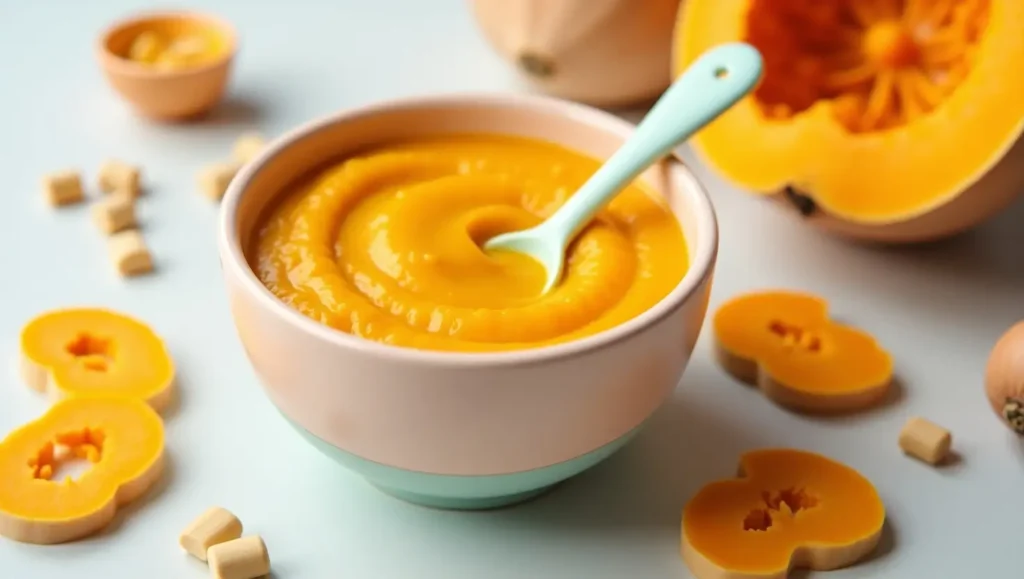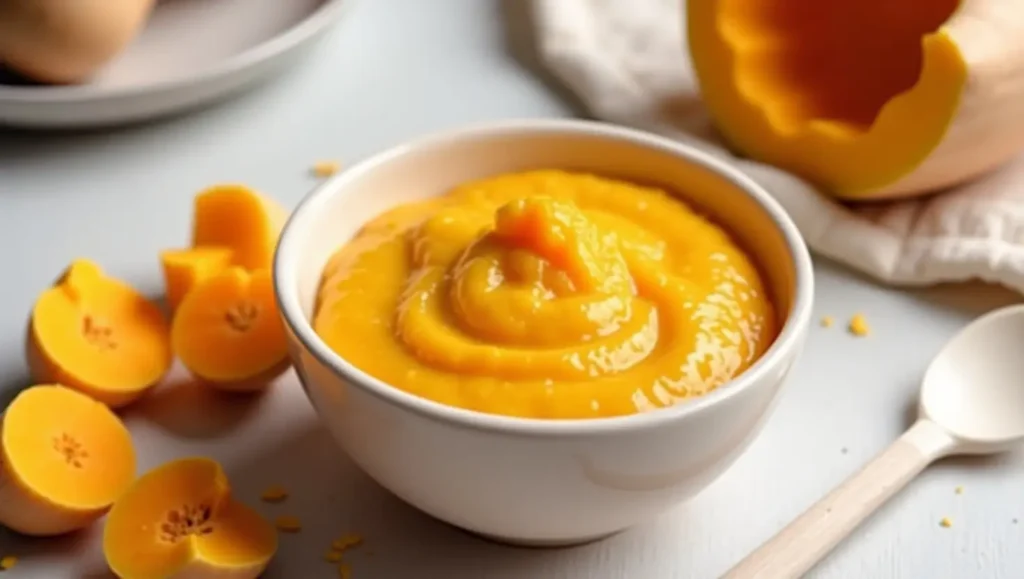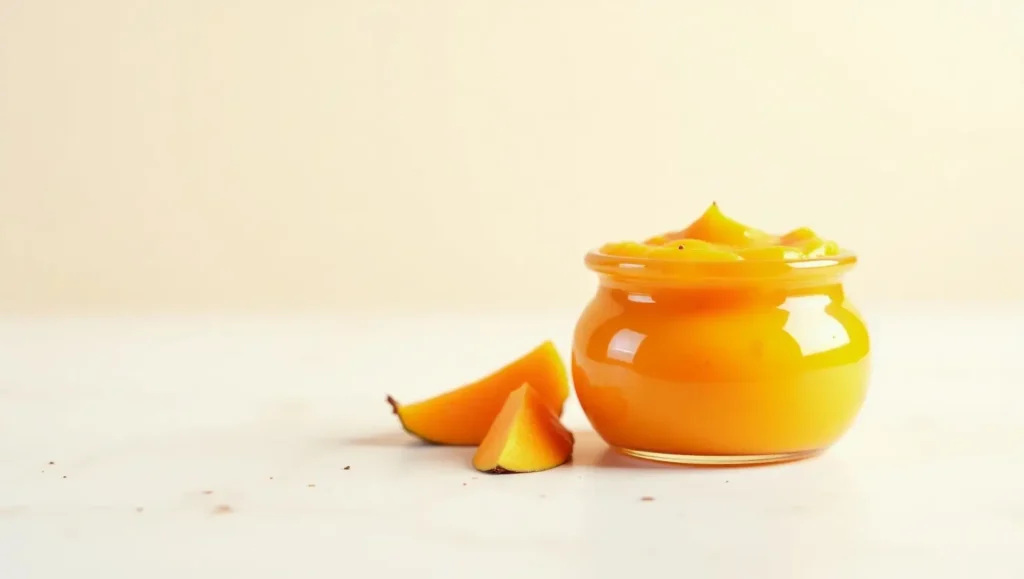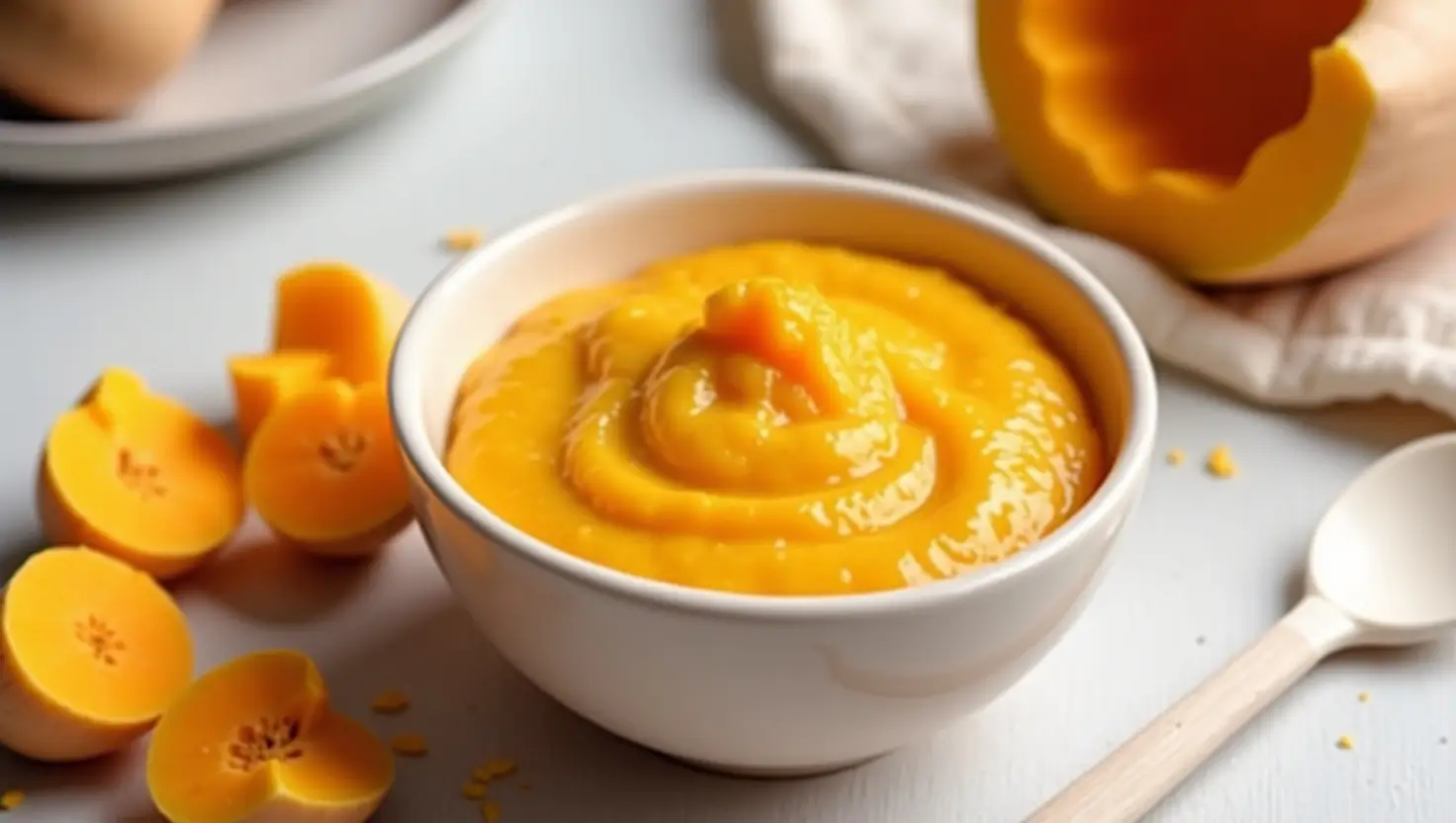Table of Contents
Introducing solids to your baby is an exciting journey for every parent. Among the best first foods you can offer is butternut squash. With its natural sweetness, soft texture, and rich nutritional profile, butternut squash baby food is a favorite among parents and nutritionists alike. In this article, we will explore everything you need to know about butternut squash for babies, including its benefits, preparation tips, puree combinations, and age-appropriate recipes.
Nutritional Benefits of Butternut Squash
Butternut squash is loaded with essential nutrients that support your baby’s growth and development. Here’s a breakdown of its key components:
| Nutrient | Benefit for Baby |
|---|---|
| Vitamin A | Supports vision, immune function, and skin health |
| Vitamin C | Helps in iron absorption and boosts immunity |
| Fiber | Aids digestion and prevents constipation |
| Potassium | Supports muscle and nerve function |
| Magnesium | Assists in bone development and energy production |
The vibrant orange color of butternut squash is a clear indicator of its high beta-carotene content, which the body converts into Vitamin A. This makes it particularly beneficial for eye health and immune development in babies.

Butternut Squash Baby Puree Combinations
Combining butternut squash with other fruits, vegetables, or grains can enhance both flavor and nutrition. These butternut squash baby puree combinations are perfect for expanding your baby’s palate:
| Combination | Benefits |
|---|---|
| Butternut Squash + Apple | Adds natural sweetness and Vitamin C |
| Butternut Squash + Carrot | High in beta-carotene and fiber |
| Butternut Squash + Quinoa | Introduces protein and essential amino acids |
| Butternut Squash + Chicken | Adds iron and protein for energy and growth |
| Butternut Squash + Peas | Increases fiber and plant-based protein |
Each of these combinations can be easily blended to create a smooth texture appropriate for your baby’s developmental stage. When introducing new foods, follow the 3-day rule to monitor any allergic reactions.
Introducing Jar Of Baby Food and Tutti Frutti Baby Food
If you’re a busy parent or looking for convenient options that maintain quality and nutrition, check out our offerings at Jar Of Baby Food . Our baby foods are made with love and the highest standards to ensure your little one gets the best start.
We source organic ingredients and carefully prepare each jar to preserve natural flavors and nutrients. Whether you’re seeking single-ingredient purees or creative combinations, our collection has something for every baby stage.

Allergy and Safety Considerations
While butternut squash is generally safe and non-allergenic, it’s essential to follow these guidelines:
- Introduce only one new food at a time.
- Watch for signs of allergies (rash, swelling, vomiting).
- Always supervise feeding sessions.
- Ensure food is appropriately textured for your baby’s age.
Feeding Schedule for Butternut Squash
When planning your baby’s meals, consistency and variety are key. Here’s a sample feeding schedule:
| Age | Quantity | Frequency |
|---|---|---|
| 6–7 months | 2–3 tablespoons | 1–2 times/day |
| 8–9 months | 1/4 to 1/2 cup | 2–3 times/day |
| 10–12 months | 1/2 cup or more | 3 times/day + snacks |
Make sure to adjust portions based on your baby’s hunger cues and activity level.
Why Choose Butternut Squash Baby Food?
Butternut squash baby food stands out for its flavor, digestibility, and nutrient content. Here are some compelling reasons to make it a staple in your baby’s diet:
- Naturally sweet taste appeals to babies.
- Easy to prepare and store.
- Combines well with many other foods.
- High in vitamins A and C for immune support.
- Gentle on your baby’s digestive system.
Transitioning from Purees to Solids
As babies grow, transitioning from purees to soft chunks is essential. Start by mashing the squash less thoroughly or mixing it with small pieces of soft-cooked vegetables or grains. This helps babies learn to chew and improves their self-feeding skills.
Encourage self-feeding with small spoonfuls or soft finger foods made from butternut squash, such as:
- Roasted squash sticks
- Butternut squash patties
- Squash-filled mini muffins
Always ensure foods are soft enough to mash with gums and cut into baby-friendly sizes.

Frequently Asked Questions
Q: Can I use frozen butternut squash for baby food?
A: Yes, frozen squash is a convenient and nutritious option. Make sure it’s plain (no added salt or spices) and fully cooked before pureeing.
Q: How long can I store homemade butternut squash puree?
A: You can refrigerate it for up to 3 days or freeze it for up to 3 months.
Q: Is butternut squash a choking hazard?
A: When cooked thoroughly and served in age-appropriate textures, butternut squash is not a choking hazard. Always supervise your baby during meals.
Conclusion
Incorporating butternut squash baby food into your baby’s diet is a nutritious and delicious way to support their development. From simple purees to exciting combinations and recipes for 8-month-olds, the versatility of butternut squash makes it an ideal choice.
Whether you’re making your own or opting for trusted store-bought varieties, butternut squash is a wholesome, baby-friendly food that grows with your child’s needs. Enjoy the journey of nourishing your little one with nature’s goodness.




2 thoughts on “Butternut Squash Baby Food”
Comments are closed.